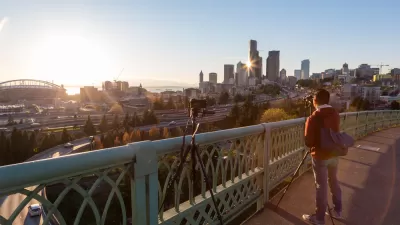In-depth coverage of the improvement efforts underway on Seattle's Rainier Avenue.
Stephen Hagg reports the shocking safety statistics created by conditions on Rainier Avenue—an eight-mile stretch of which through South Seattle is the city's most dangerous thoroughfare: "In the last three years, there have been over 1,200 accidents, 600 injuries and two fatalities on Rainier."
In Spring 2015, however, the city began to reconfigure Rainier Avenue to slow down traffic and create safer conditions for pedestrians:
"The pilot project lowers the speed limit to 25 miles per hour, and takes busy Rainier from four directional lanes to two, with a center turn lane to eliminate the deadly left-hook crashes. The street now has enhanced traffic signals, longer pedestrian crossing times and more turn restrictions."
The article also presents the arguments of the opponents to the project, which say Rainier Avenue is more congested before. Hagg is writing for KCTS, which also produced the video below. A tip of the hat goes out to Tom Fucoloro of Seattle Bike Blog, who calls the video concise and clear.
FULL STORY: Fixing Rainer

Planetizen Federal Action Tracker
A weekly monitor of how Trump’s orders and actions are impacting planners and planning in America.

Restaurant Patios Were a Pandemic Win — Why Were They so Hard to Keep?
Social distancing requirements and changes in travel patterns prompted cities to pilot new uses for street and sidewalk space. Then it got complicated.

Map: Where Senate Republicans Want to Sell Your Public Lands
For public land advocates, the Senate Republicans’ proposal to sell millions of acres of public land in the West is “the biggest fight of their careers.”

Orange County, Florida Adopts Largest US “Sprawl Repair” Code
The ‘Orange Code’ seeks to rectify decades of sprawl-inducing, car-oriented development.

Maui's Vacation Rental Debate Turns Ugly
Verbal attacks, misinformation campaigns and fistfights plague a high-stakes debate to convert thousands of vacation rentals into long-term housing.

San Francisco Suspends Traffic Calming Amidst Record Deaths
Citing “a challenging fiscal landscape,” the city will cease the program on the heels of 42 traffic deaths, including 24 pedestrians.
Urban Design for Planners 1: Software Tools
This six-course series explores essential urban design concepts using open source software and equips planners with the tools they need to participate fully in the urban design process.
Planning for Universal Design
Learn the tools for implementing Universal Design in planning regulations.
Heyer Gruel & Associates PA
JM Goldson LLC
Custer County Colorado
City of Camden Redevelopment Agency
City of Astoria
Transportation Research & Education Center (TREC) at Portland State University
Camden Redevelopment Agency
City of Claremont
Municipality of Princeton (NJ)




























